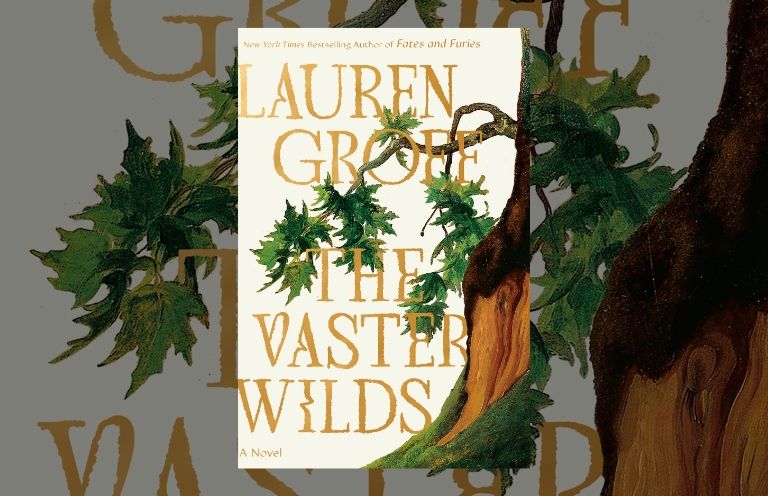 In Lauren Groff’s latest novel, The Vaster Wilds, the author gives us the American myth in its truest form: not the victor, not the conqueror, not the pillager or the plunderer, but a woman, a girl really, brought to this new world against her will. This is mythology as only a woman can tell it—one that attempts to tackle the implications of supremacy and place.
In Lauren Groff’s latest novel, The Vaster Wilds, the author gives us the American myth in its truest form: not the victor, not the conqueror, not the pillager or the plunderer, but a woman, a girl really, brought to this new world against her will. This is mythology as only a woman can tell it—one that attempts to tackle the implications of supremacy and place.
Very little happens in this novel and yet everything happens. In flashback, The Vaster Wilds is the story of a girl with little control over her life, who is fortunate to find a home as a servant to a wealthy family, until that luck turns and she finds herself traveling to the New World. She exercises control in the ways that she can, and the great joy of her life is caring for the child Bess, daughter of the girl’s mistress.
In the present, it is a story of survival. Each day for the protagonist is a battle, of tending to her travel weary body, of staying warm enough and dry enough and rested enough. So much of what the girl must do to stay alive is figure out what to eat, and she grapples with what her eating takes from the world. In fleeing her dying community, she contends with her place at the top of the food chain, inflicting cruelties to survive that often mirror the injustice she has suffered. She takes a handful of baby squirrels from their mother to eat, and knows the grief of loss that squirrel suffers.
Like much of Groff’s previous work, most recently Matrix, The Vaster Wilds is concerned with the entirety of a life—and even beyond, in the final pages. The other characters at play here—of which there are few—are also given generous treatment in the small spaces they are afforded. About midway through the novel, the girl’s path briefly intertwines with that of a man living in the wilds. Who “seemed a chimera, half man, half beast,” but was, in a past life, a Spanish Jesuit priest come to the new world to form a mission. Chapter 8 tells his story, from arriving on the continent some forty years previously, to fleeing a burning mission and establishing a life for himself (at the removed permission of the Powhatan) in the wilderness, slowly losing himself and his language. Such broad detail, even to the smallest of characters, gives the novel a grand scope.
The language, too, is grand. Often, the story fixates on the minutiae of the girl’s life: the quality of her bowel movements, the blisters on her feet, the feeling of a fever coursing through her body. And then the lens moves outward and backward, taking in the wide, unknown landscape surrounding our heroine: “She knocked at the ice curtain with the back of her hatchet until it loosed then she pushed it open to an astonishment of the world. The whole forest was glistening silver in the night. After the hail, there had been freezing rain… All the trees wore coats of ice so thick that they seemed glazed over with glass, and the stars shone so bright upon the world that the world shone back at the stars in stupid dazzlement.”
The time that fills these pages is a horrible time. The girl suffers winter, suffers starvation. She is plagued by nightmares, hunted by men. The boots that keep her feet warm also stab her with nails. And yet this is the freest she has ever been. She is surrounded by the beauty of the New World in all its terrific splendor. By focusing in equal part on the specifics of the girl pulling her skirts up and squatting to the ground and on the beauty of a drop of rainwater on an oak leaf, Groff’s vivid prose makes that dissonance even more stark.
That beautifully rendered landscape is what begins to fill the void of organized religion as the course of her journey strips down her faith to something new and raw. “Then god was changeable according to the body god spoke through,” thinks the girl, as she begins to understand religion as she has been taught it and what it means, to understand the voice of man in the voice of god.
You feel in these pages a response to the traumas of the last three to ten years: a call for community, for nature, for an end to the rule of men who stand their pulpit and preach poison. What in other hands would be a tale of violence is instead a story of introspection. Our hero is not a strapping man who conquers or pillages, but a girl who weeps and emerges trembling from fevered dreams and gets back up and keeps on walking. By the end of the story she has come to a conclusion at odds with the colonizing machine that has carried her forward: “this place and these people did not need the english to bring god to them.”
A visceral depiction of survival in an unforgiving world, Groff’s latest novel is a sweeping ode to the natural world and the strength of the quietest among us.
Publisher: Riverhead Books
Publication date: September 12, 2023
Reviewed by Kathryn Ordiway
